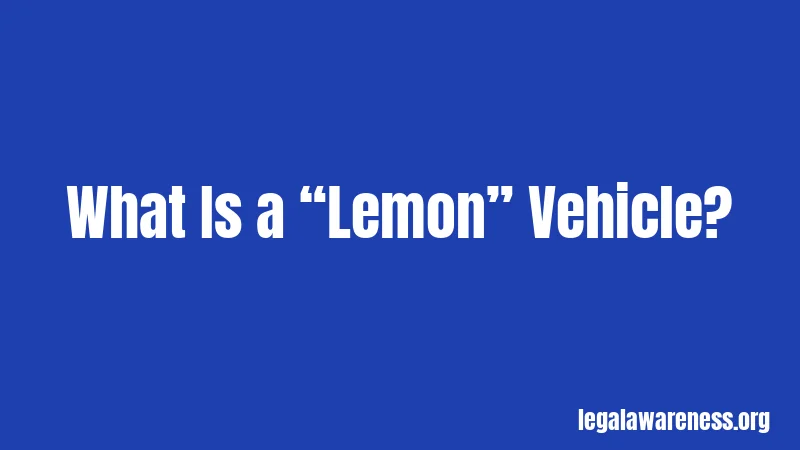North Carolina Lemon Laws (2026): Your Complete Consumer Protections Guide
Most people have no idea this law even exists. Seriously. But if you bought a new car in North Carolina and it keeps breaking down, you might actually have powerful legal rights. The good news? You could get a full refund or a brand-new replacement vehicle. Stay with me here—this could save you hundreds or even thousands of dollars.
North Carolina’s lemon law is there to protect you when a manufacturer can’t seem to fix a major problem with your vehicle. No matter how many times you take it to the dealership, something just keeps going wrong. That’s what this article is all about. Let’s break down exactly what you need to know.
What Is a “Lemon” Vehicle?

Here’s the basic idea: a lemon isn’t about the car color or how it looks. A lemon is a new vehicle that has a serious defect the manufacturer can’t fix. We’re talking about problems that affect how the car drives, its safety, or its overall value.
Think of it like this. You buy a brand-new truck. The transmission keeps slipping. You take it to the dealer. They fix it. A week later, it happens again. This happens four or five times. That’s a lemon. It doesn’t have to be something that stops you from driving. Even issues like broken air conditioning or peeling paint can count.
The North Carolina Lemon Law Basics
North Carolina’s lemon law has an official name: the New Motor Vehicles Warranties Act. It’s been protecting consumers since 1987. The law is pretty straightforward, honestly. Here’s what you need to know.
What Vehicles Are Covered?
Right, this is important. The law covers almost any new motor vehicle you buy or lease in North Carolina. We’re talking about cars, pickup trucks, motorcycles, and most vans. The only rule? The vehicle can’t weigh more than 10,000 pounds.
What doesn’t qualify? Used cars don’t count. Mopeds don’t count. House trailers don’t count. And anything heavier than 10,000 pounds is out. Pretty straightforward, right?
Also, this only applies to the first owner or lessee. If you buy a car from someone else, even if you’re the first owner in North Carolina, the lemon law doesn’t cover you. You had to buy it brand-new from the dealer.
The Time Window
Here’s where timing matters. You have a specific window to qualify for the lemon law. The problem must happen within the first 24 months or the first 24,000 miles. Whichever comes first.
Let’s say you buy a car in January. If the problem shows up in March of the next year, you’re good. But if it happens after you hit 24,000 miles, even if it’s only been two months, you’re outside the window. This is crucial to understand.
Now, there’s something else important. The manufacturer’s warranty has to cover the defective part. You can’t claim a lemon law violation for a part that was never under warranty.
What Counts as a Defect?
Not every problem qualifies under the lemon law. The defect has to “substantially impair” the vehicle’s use, value, or safety. That’s the legal language, but what does it actually mean?
Substantially impair means the problem is serious enough that it affects whether you can use the car or how much it’s worth. A broken windshield wiper probably doesn’t count. But an engine that keeps dying? Yeah, that counts. Brakes that feel soft? That’s a safety issue—definitely counts.
The law also excludes defects caused by abuse, neglect, or unauthorized modifications. If you don’t get regular oil changes and the engine fails, that’s on you. The lemon law won’t help. But if the transmission fails for no reason you caused, you’re protected.
When You Get Repairs (Or Try To)

Okay, so you found a problem. What happens next? You need to notify the manufacturer about the defect. You can do this directly or through an authorized dealer. Put it in writing—that’s the safest way.
Once you report the problem, the manufacturer has to fix it. They get a reasonable amount of time, but it can’t be more than 15 days. After that, they can’t keep delaying. They need to actually repair the vehicle or eventually offer you a replacement or refund.
Here’s the key part. The manufacturer gets multiple chances to fix the same problem. But how many chances? That’s where the law gets specific.
How Many Repair Attempts Count?
The law uses the phrase “a reasonable number of attempts.” Sound vague? It is, but North Carolina clarifies this. You hit a presumption point when either of these happens:
The vehicle has been taken in for repairs four or more times for the same exact problem, but it still isn’t fixed. Or the vehicle is out of service for repairs for a total of 20 or more business days combined, no matter how many different problems there are.
Once you hit either of those points, the manufacturer has to offer you a refund or replacement. They can’t keep trying to fix it.
Wondering what happens if they fix a different problem each time? Good question. If you have one problem that returns multiple times, that’s what counts toward the four-repair trigger. Different problems are handled separately, but the 20-day out-of-service rule still applies overall.
What You Get If You Win
Hold on, this part is important. If the manufacturer can’t fix your vehicle after reasonable attempts, you have a choice. You can get a replacement vehicle or a full refund. Let’s talk about what each option means.
Replacement Vehicle
If you choose replacement, the manufacturer has to give you a comparable new vehicle. That typically means the same make and model. You shouldn’t get something significantly different in value or features.
When you get that replacement, you basically start fresh. It’s like buying a new car all over again. The mileage gets reset. The warranty clock restarts. Pretty cool, right?
Full Refund
If you’d rather have your money back, you can take that option instead. But here’s where it gets interesting. The refund isn’t always the full purchase price. Let me break this down.
The manufacturer refunds the full contract price. That includes the base price plus charges for things like undercoating, dealer prep, and any options you added. Sales tax? Yep, they refund that too. License and registration fees? Included.
Here’s the deduction part. They subtract something called a “reasonable allowance for use.” Basically, they deduct money based on how many miles you drove. The calculation divides your mileage by the miles covered under warranty, then multiplies by the purchase price.
Sound unfair? North Carolina actually limits this. After three repair attempts or 20 days out of service, the mileage deduction gets capped. This prevents manufacturers from penalizing you too heavily just because you drove the car.
They also refund finance charges. If you paid interest after you reported the problem, they cover that. Any incidental damages also get refunded to you.
Special Circumstances and Exceptions

Let’s talk about some situations that don’t fit the typical pattern. These matter because your case might involve them.
What If You Didn’t Report It in Time?
Here’s something that confuses a lot of people. You need to report the problem within the greater of three things: the express warranty period, one year, or 12,000 miles. In other words, you have plenty of time.
But manufacturers can require arbitration. Arbitration is like a mini-trial before a mediator instead of going to court. Some manufacturers require you to try arbitration before filing suit. That’s legal in North Carolina.
Here’s the thing about arbitration, honestly. It’s faster and cheaper. But if you lose, you can’t take it to court later. So think carefully about this choice. A lemon law attorney can help you decide if arbitration makes sense for your situation.
What About Dealer Liability?
This is interesting. Sometimes the dealer might be responsible instead of (or in addition to) the manufacturer. If the dealer caused the problem through installation, maintenance, or repair, you might have claims against them too.
Most lemon law cases focus on the manufacturer. But don’t assume the dealer is off the hook. Talk to an attorney if you think the dealer caused your problem.
Repairs After the Warranty Expires
Here’s something important. Even after your warranty officially expires, the manufacturer still has to fix the vehicle if you reported the problem within the warranty period. The law requires the manufacturer to repair the car to match the warranty, even if repairs happen after the expiration date.
This is huge. You don’t lose your rights just because time passes. You have to report the problem while covered. The repairs can happen later.
How Much Does This Cost You?
Here’s the really good news. If you win your lemon law case, the manufacturer pays your attorney fees. You don’t pay anything out of pocket.
Most lemon law attorneys work on contingency. That means they only get paid if you recover. If they don’t win your case, you owe them nothing. Zero. That’s how the law incentivizes attorneys to take cases and manufacturers to settle them.
This matters because lemon law cases can be complex. Expert attorneys cost money. But the law says the manufacturer covers that. So don’t hesitate to hire an experienced lemon law lawyer.
How to Get Your Refund or Replacement
Step one is crucial: document everything. Keep records of every repair attempt. Write down the date, the problem, what they tried to fix, and what happened. Take photos of defects when you can. Get copies of all repair orders.
Next, write a formal notice to the manufacturer. Email works, but certified mail is even better. Describe the problem clearly. Mention all the repair attempts. State that you want either a refund or replacement.
The manufacturer then has time to respond. If they offer replacement or refund, great. If they refuse or delay, you might need to file an arbitration claim or lawsuit.
Here’s where getting a lemon law attorney helps. They know exactly how to present your case. They understand what paperwork matters. They can negotiate with the manufacturer’s legal team.
If arbitration is required, it happens before a neutral arbitrator. You present your evidence. The manufacturer presents theirs. The arbitrator decides. If you win, you get your remedy.
If you go to court, you have the right to a judge or jury trial. But most cases settle before trial. The manufacturers know you have strong rights, and they often prefer to settle rather than go to court.
What Happens If the Manufacturer Refuses?
Not all manufacturers play fair. Some refuse to honor the lemon law even when it clearly applies. If that happens, you can sue. And here’s the good part: if you sue and win, the manufacturer pays triple damages in addition to your refund or replacement.
Triple damages means three times what you’d normally recover. So if your car cost $30,000 and you should get a refund, you’d get $90,000. Plus attorney fees. Plus your incidental damages.
This penalty exists specifically to encourage manufacturers to respect the law. They know that refusing to settle costs them way more in the long run.
Contact Information and Resources
If you’re dealing with a defective vehicle, there are places to turn for help.
North Carolina Attorney General’s Office Consumer Protection Section P.O. Box 629 Raleigh, NC 27602 Phone: (919) 716-6000 This office can provide information and attempt mediation. They can also file suit if a pattern emerges.
Legal Aid of North Carolina Legal Aid has clinics and workshops about lemon law. Visit: lawhelpnc.org
BBB AUTO LINE BBB offers arbitration for warranty disputes. Website: bbbprograms.org This is an informal dispute resolution option.
Better Business Bureau (BBB) You can file complaints and check ratings for dealers. Website: bbb.org
Frequently Asked Questions
Can I get a lemon law refund if I leased instead of buying? Yes! The lemon law covers both purchases and leases. If you’re leasing and the vehicle qualifies, you have the same rights as someone who bought it.
What if my vehicle has been repaired only twice? Usually you need four repairs for the same problem or 20 days out of service. But federal law (the Magnuson-Moss Warranty Act) might apply too. Some people have won with fewer repairs. Talk to an attorney about your specific situation.
Does the lemon law cover used cars? No. The lemon law only covers new vehicles. However, federal warranty law might protect you with used cars if they still have manufacturer warranty coverage.
How long do I have to file a claim? The defect must occur within 24 months or 24,000 miles. But for filing a claim, you likely have at least four years from when you discovered the problem. Check your warranty paperwork because some manufacturers limit this to one year.
Can I still drive the car while pursuing a lemon law claim? Yes, you can keep driving it. In fact, you should. The “use deduction” in refund calculations accounts for normal mileage. You’re not penalized for using the car the way you’re supposed to.
Final Thoughts
North Carolina’s lemon law exists specifically to protect people like you. If you bought a new vehicle and it keeps having serious problems, you have real legal rights. You’re not stuck with a broken car. You’re not helpless against a big manufacturer.
Document your repairs. Keep records. Report problems in writing. If the manufacturer won’t cooperate, get a lemon law attorney. They work for free if you don’t win. And most manufacturers would rather settle than face the consequences of a lawsuit.
Now you know the basics. Stay informed, stay proactive, and when in doubt, reach out to a lemon law attorney or the North Carolina Attorney General’s office. You deserve a vehicle that works.
References
North Carolina Attorney General – Lemon Law Information
Legal Aid of North Carolina – Lemon Law Resource
BBB AUTO LINE Lemon Law Programs
North Carolina General Statute 20-351 through 20-351.11 (Full Lemon Law Text)
